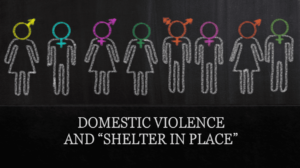One of the unforeseen consequences of the COVID-19 pandemic and subsequent “Shelter in Place” ordered for all residents of Texas is the increase in arrests for or involving domestic violence. It is only natural for people who are basically trapped in the same confined space to have conflicts. Add intoxicants, particularly alcohol, into any tense situation and the possibility for violence will almost certainly increase exponentially.
 In Texas, the elements of the crime of “Assault – Family Violence” are as follows: A person commits an offense if they recklessly, knowingly, or intentionally (1) cause bodily injury to another person; (2) threaten another person with bodily injury; or (3) cause physical contact with a person that they should reasonably have to believe the other person would regard as offensive or provocative. A “family member” is defined as someone that lives in the same household, is involved in a dating relationship with, or is related by blood or law. “Family member” can mean wife, girlfriend, husband, boyfriend or even roommate.
In Texas, the elements of the crime of “Assault – Family Violence” are as follows: A person commits an offense if they recklessly, knowingly, or intentionally (1) cause bodily injury to another person; (2) threaten another person with bodily injury; or (3) cause physical contact with a person that they should reasonably have to believe the other person would regard as offensive or provocative. A “family member” is defined as someone that lives in the same household, is involved in a dating relationship with, or is related by blood or law. “Family member” can mean wife, girlfriend, husband, boyfriend or even roommate.
A first-time offense for Assault – Family Violence is a Class A Misdemeanor, punishable by up to one year in jail, a $4,000.00 fine, or both. If a person has even one previous conviction for Assault – Family Violence, the charge is enhanced to a Third-Degree Felony, with a punishment range of 2 – 10 years in prison, a $10,000.00 fine, or both. Even if a person entered a plea of No Contest and received Deferred Adjudication (no conviction) on their previous Assault – Family Violence charge their new charge can still be enhanced to a felony. It is also a Third- Degree Felony if a person intentionally, knowingly or recklessly impedes the breathing of the victim in an Assault – Family Violence case.
There are important collateral consequences of being convicted of Assault – Family violence. Most importantly, a conviction will result in a ban on ownership or possession of guns or ammunition and can prevent the convicted person from having custody of a child after a divorce.
It is also important to note that many Assault – Family Violence charges come with what is known as protective or stay-away orders. These orders are issued by a judge and require the person accused of the assault to refrain from doing certain things such as coming in contact with the alleged victim or coming within a certain distance of the alleged victim. It is vitally important to obey these orders while the case is pending. Violating any of these provisions can result in additional charges being filed. Needless to say, this also complicates the original case going forward. Judges can and do issue these orders as a condition of being released on bond. If a judge issues any Protective Orders or Stay Away Orders as part of your bond do not violate those orders. An attorney is vital to negotiating or lifting the conditions or orders.
It is important to hire an experienced criminal defense lawyer if you or a loved one is accused of Assault – Family Violence. Often these cases are not as black and white as they appear to be. An experienced criminal defense lawyer can help you navigate the legal minefield of defending this serious charge. Even if the case is weak or eventually dismissed, the collateral consequences of the accusation can be pervasive. If you ever get into a heated argument with a significant other (or even a roommate), the best advice is to take a deep breath, walk away and do everything in your power to control the situation (and yourself). Violence is not the answer.
